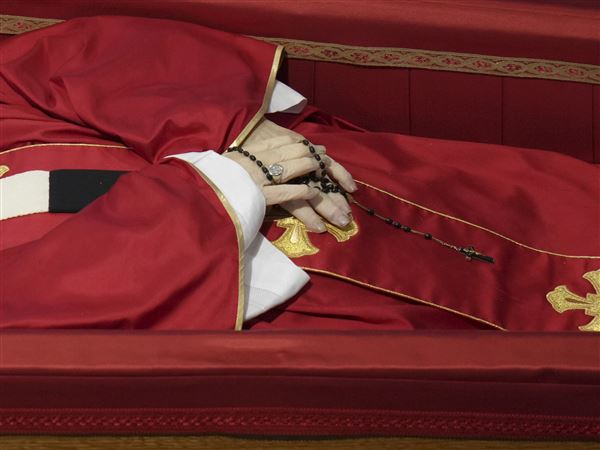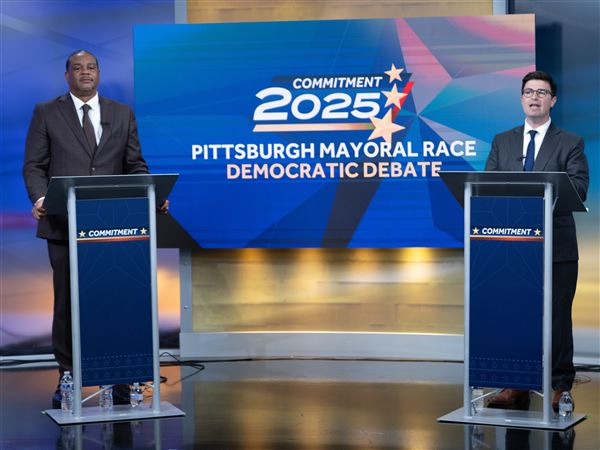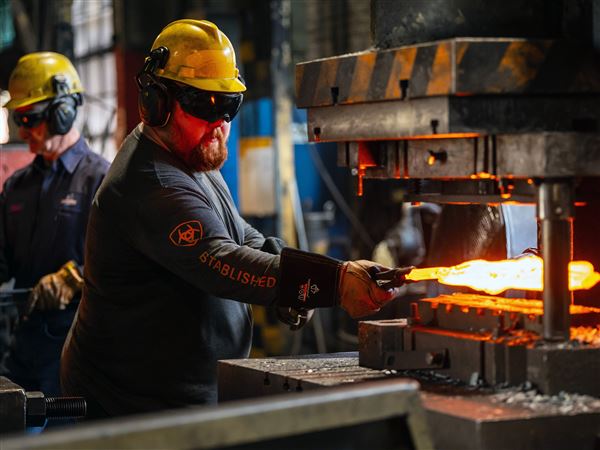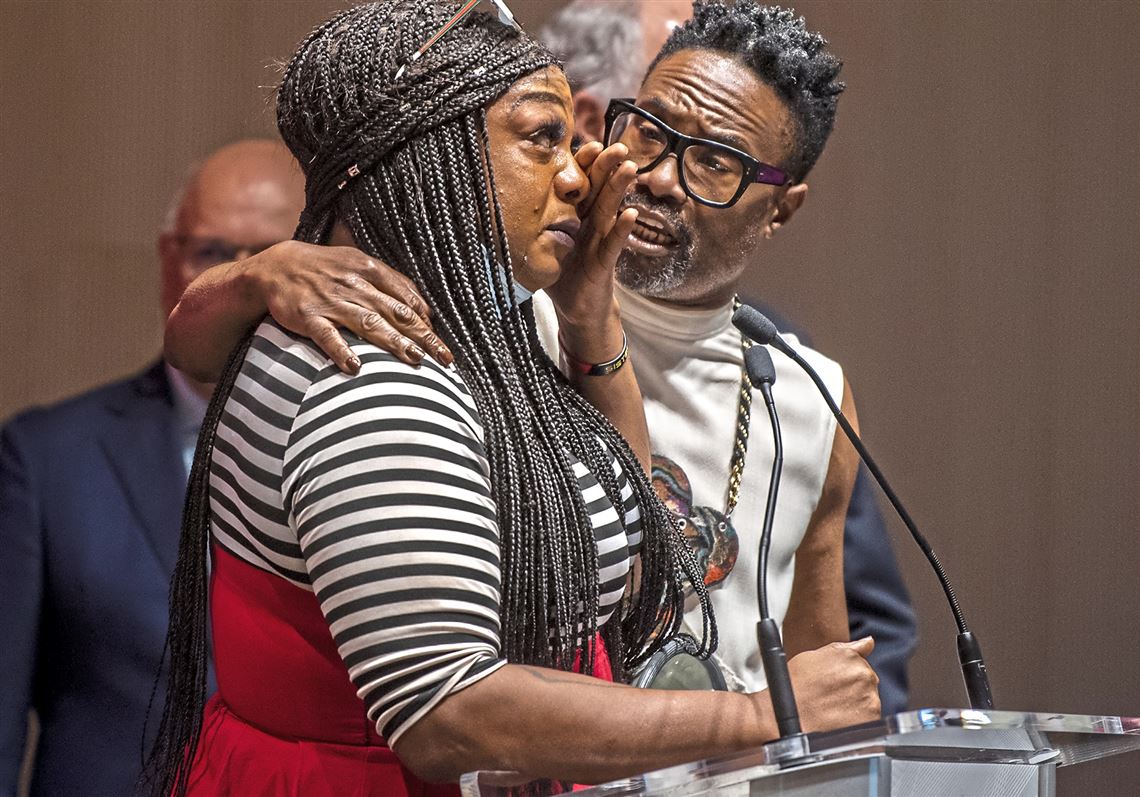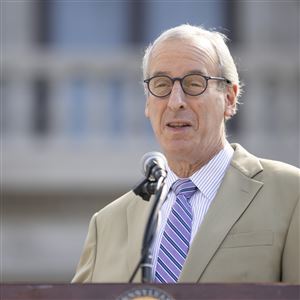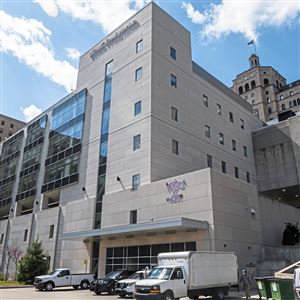Emotions were high Tuesday afternoon during an LGBTQ+ listening session with U.S. Sen. Bob Casey at Carnegie Mellon University where award-winning actor and singer Billy Porter stepped in to intercede and offered words of wisdom when a local transgender activist interrupted the panel to share her frustration.
“I came up here to send a message, I don't want to start any violence,” said Ciora Thomas, an LGBTQ+ activist and founder of SisTers PGH after making her way to the podium at CMU's Tepper School of Business. “I see a lot of white folks looking at me as if I've done something wrong because I'm Black and trans.” The hourlong event was supposed to begin at 1 p.m., but Ms. Thomas, in an unscheduled act, stepped up to the podium to speak.
Mr. Porter — a CMU alumnus and Pittsburgh native — crossed his legs, listened intently and leaned in as Ms. Thomas continued, expressing frustration that SisTers PGH and other transgender groups and community members weren't invited to the panel.
“I have worked my ass off for 15 years to provide for our Black trans women and girls in Pittsburgh,” Ms. Thomas said. “Fifteen years of my life, [I] came straight from homelessness, [I was] born and raised here … I have spent my life to make sure that my community is represented the correct way.” SisTers PGH aids in rehabilitating transgender people, people of color and impoverished individuals, as well as those that have been “victimized by a restrictive and oppressive society that continues to marginalize them,” according to the group’s website.
Mr. Casey, who also read the names of transgender people who have been killed in Pennsylvania, later admitted the panel could do better in the future in selecting participants.
“Do you know my organization? Have you heard of it? You don’t,” Ms. Thomas said as Mr. Casey listened. “You should know SisTers PGH; look us up on Instagram, look us up on Facebook.” At this point, a security guard walked up to Ms. Thomas and attempted to gesture her away from the stage. Ms. Thomas looked around the room and asked for her allies to speak up.
“If y’all arrest me during Pride Month — police, please get away from me,” she said. “Where's my allies in this room to get this police away from me? Who’s going to stand up for a Black trans woman in this room?”
The dozens of people in attendance fell silent for a moment, except for a few of Ms. Thomas’ friends. Mr. Porter interceded and encouraged Ms. Thomas that she was seen and heard. He asked her to be “clear and precise” in her communication, for the sake of educating others. The security guard eventually fell back and left Ms. Thomas alone.
“I see you, I hear you and I get it,” Mr. Porter said to Ms. Thomas. “If there’s anybody in this room who gets it, it’s me. I grew up in the neighborhoods you did. But what is the point of this? … It doesn't always happen right, I understand that, but we have to keep educating.” The two went back and forth for a short while in heated conversation.
Soon after, Mr. Porter addressed the room on Ms. Thomas’ behalf.
“There cannot be any more trans conversations in Pittsburgh without the Black trans community being represented,” Mr. Porter said. “Period.”
Panelist Dena Stanley, CEO and founder of TransYOUniting and a transgender woman, also spoke up in the moment and said “hurt people, hurt people,” and expressed that she and Ms. Thomas have endured much hardship in Pittsburgh.
“Our goal here is to help our community, to help our people, to help our sisters,” Ms. Stanley said. “We both have been doing that. It starts with you, every person in this room. We need allies to stand up for us and fight back.”
In addition to Mr. Casey, Mr. Porter and Ms. Stanley, other panelists included Dr. Elizabeth Miller, director of the Division of Adolescent and Young Adult Medicine at UPMC (moderator), Rafael Álvarez Febo, the executive director of the Pennsylvania Commission on LGBTQ Affairs, and Dr. Johanna Burnett, LGBTQ+ educator and activist.
Mr. Casey shared the importance of passing The Equality Act, which would amend existing civil rights law, including the Civil Rights Act of 1964, the Fair Housing Act, the Equal Credit Opportunity Act, the Jury Selection and Services Act, and several laws regarding employment with the federal government. The Equality Act would include sexual orientation and gender identity as protected characteristics, according to online data.
As discussion flowed, Mr. Febo said there is more work to be done to pass HB300, also known as the Pennsylvania Fairness Act.
“I work with the governor's office, but the main focus is policy,” Mr. Febo said. “I think with the movement last year, we saw an expansion of rights under Title VII. Now, if employers have 15 employees or more, you must ensure that you do not discriminate. But we have a gap in Pennsylvania where most businesses are 15 people or less. So that's where the Pennsylvania Fairness Act, HB300 [comes in]. It’s an amendment to the Pennsylvania Human Relations Act, so it's basically the Pennsylvania version of the Civil Rights Act, and that's how we enforce things in the commonwealth.
“If you live in rural Pennsylvania, and say you need to go to a pharmacy, and you live somewhere that takes 20 minutes to get your prescriptions, if you're a nonbinary person and that pharmacist wants to refuse you services, they are not compelled by the law to provide those for you. So that is a real gap in the way we legislate this stuff. The reality around the Civil Rights Act is people did not want to comply with it. But having the tool to say you must comply gives people with hate in their heart fear around expressing that hate. Laws do not help people be less hateful. They give people a tool to say the law protects me.”
HB300 gets introduced every session, and every session it doesn't leave committee, and that's a “huge problem,” Mr. Febo said.
Mr. Casey said work still remains to be done in fighting for full equality under the law for the LGBTQ+ community.
“Sometimes what can initially be perceived as a delay in a program or an interference, can become a moment to educate,” he said. “Ciora certainly educated me, as did other members of the panel.”
Mr. Porter commended Ms. Thomas for her bravery and said he was “proud” of her for speaking up.
“I am living the impossible, and yet there are still communities that are left behind,” Mr. Porter said. “These conversations for me are good, but conversations have to be backed up with action. Conversations have to be backed up with substantial change, and change for good.
“Like Stacey Abrams said, ‘The system is not broken, it's not broken. It's working exactly the way that our founders who owned slaves set it up to work.’ And they don’t even want to let us teach that in history class.”
Lacretia Wimbley: lwimbley@post-gazette.com, 412-263-1510 or on Twitter @Wimbleyjourno.
First Published: June 29, 2021, 3:56 p.m.
Updated: June 29, 2021, 9:28 p.m.

